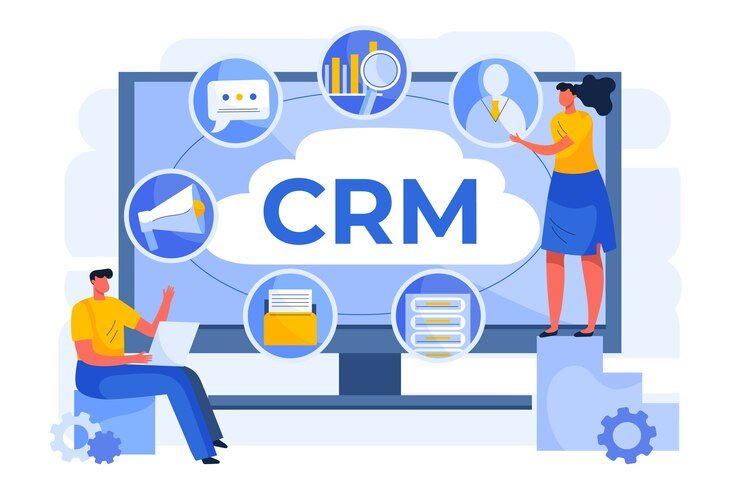Cloud-based customer relationship management (CRM) solutions are revolutionising how businesses handle customer interactions. They offer exceptional accessibility, scalability, and cost-effectiveness compared to traditional on-premise systems. Cloud CRMs provide real-time access to customer data from any location with an internet connection, facilitating improved team collaboration and enhanced customer service. Moreover, these adaptable solutions enable businesses to modify features and user access according to their changing requirements.
Microsoft 365 CRM offers numerous benefits as a cloud-based solution, including seamless integration with other Microsoft tools, real-time access to customer data, enhanced security, and scalability. With lower initial costs, automatic updates, and robust security measures, cloud-based CRMs not only streamline operations but also ensure data integrity and compliance. These advantages make cloud systems indispensable for modern businesses striving for growth and efficiency.
Easy Installation:
In many organisations, there’s a common belief that implementing a system is a complex and time-consuming process. However, with the advent of cloud-based CRMs, this no longer holds. A modern cloud-based CRM can be set up quickly and easily, requiring only an internet connection.
Once you’re signed in, you can immediately start utilising the software and its full range of features.
There’s no need to invest in hardware, worry about server and software maintenance, or keep an IT person on-site around the clock. Complex installations, data migrations, and system upgrades are all managed by the cloud service provider, allowing you to focus on leveraging the CRM for your business needs.
Is Your Content Marketing Failing? This Guide Can Fix It
The Room for Scalability:
Small businesses naturally aim to expand over time. However, they may encounter challenges when their existing software or tools fail to keep up with their growth. For instance, as a company hires new employees or introduces new services for customers, the software needs to adapt accordingly.
If the business uses an on-premise CRM, its ability to meet the evolving needs of the growing business may vary.
The software’s capacity to accommodate expansion depends on the pace and scale of the company’s growth. Additionally, changes in staffing, such as downsizing to reduce costs, may necessitate the ability to scale back operations within the system.
Flexibility:
Cloud-based CRM solutions offer significant advantages in terms of flexibility, allowing businesses to quickly adapt to evolving needs and circumstances. These systems can be easily customised and integrated with other tools, ensuring that the CRM can grow alongside your business processes. Users can access the CRM from any device with internet access, making remote work and collaboration across different locations more feasible. Moreover, cloud CRMs can be effortlessly scaled up or down, accommodating growth or contraction without significant investment or downtime.
This flexibility supports business agility and helps to ensure that the CRM system remains aligned with organisational goals and customer demands.
Data Security and Compliance:
Cloud-based CRM solutions offer significant benefits in terms of data security and compliance. Top cloud CRM providers employ advanced security measures, including data encryption, multi-factor authentication, and regular security audits, to safeguard sensitive customer information. They also ensure compliance with industry standards and regulations such as GDPR, HIPAA, and CCPA, which can be difficult for individual businesses to handle on their own.
As a result, businesses can have confidence that their data is both secure and compliant with the most recent legal requirements. Moreover, cloud CRMs provide reliable data backup and disaster recovery solutions, thereby reducing the risk of data loss and ensuring business continuity.
Things to Consider Before Starting the App Development Process
Great Reliability:
Cloud-based CRM solutions are very reliable. They ensure that businesses can always access and manage their customer data without any interruptions. These systems have high uptime and are always available because they have strong infrastructure and backup plans.
The software is always kept up to date and runs smoothly, which reduces downtime and IT work. Also, cloud providers use very strict security measures, like data encryption and regular backups, to protect against data loss and cyber threats.
This reliability helps users trust that their important customer information is safe and always available, which ultimately improves productivity and customer service.
Customer Support:
Cloud-based CRM solutions provide excellent customer support benefits. These systems offer strong support services, including round-the-clock technical help, extensive training resources, and user-friendly interfaces. This makes it easier for businesses to quickly resolve any issues, reduce downtime, and boost productivity. Additionally, cloud CRMs enable real-time collaboration and data sharing among support teams, leading to quicker response times and more personalised customer interactions. The included analytics tools also give insights into customer behaviour, allowing businesses to proactively address customer needs and improve overall satisfaction.
Conclusion:
Cloud-based CRM solutions have many benefits for businesses. They make it easier to manage customer relationships and improve business operations. These solutions are accessible and can grow with your business without needing a lot of investment in infrastructure. They are cost-effective, have automatic updates, and have strong security measures to keep your data safe and compliant. They can also easily work with other tools and provide real-time analytics for better decision-making. Overall, cloud-based CRMs are essential for modern businesses aiming to enhance efficiency, customer satisfaction, and overall performance.





